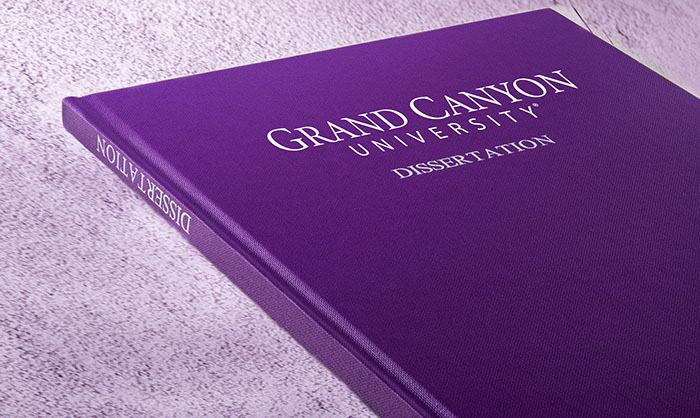
Sixth of a nine-part series spotlighting each GCU college as the fall semester begins.
By Ashlee Larrison
GCU News Bureau
It has been 10 years and more than 1,000 signed dissertations since Grand Canyon University’s College of Doctoral Studies began, and the anniversary marks the college’s next step in its evolution.

CDS has prided itself on the unique tools – such as the Dissertation Milestone Guide, proposal and dissertation templates, its proprietary research network (DC Network™) and an early dissertation focus – it has used to better prepare learners for 250-page dissertations. Now the faculty is working to make those tools even more effective.
“We’ve learned a lot in the last 10 years,” said Dr. Ronald Berman, CDS Associate Dean. “We realized we had to redesign the entire core research program and place greater emphasis on the process of research and the process of writing.”

The shift is designed to provide the option for learners to focus their research either on quantitative research, which focuses more on numerical data, or qualitative research, which relies more on non-numerical data. Each path attracts about 50% of learners.
“We’ve split the curriculum so that learners can select a track,” said Dr. Cynthia Bainbridge, also an Associate Dean. “They can select a quantitative track or a qualitative track.
“Learning is in the doing, and that’s one of the key design principles that we have embedded into this new curriculum. If learners are in the qualitative track, they’re going to have substantive experiences, assignments in service to learning how to collect qualitative data, perhaps from a focus group or practicing interviews, and then using world-class qualitative software tools to analyze that data. The same would hold true of learners that are on the quantitative track.”

This new version of the program already is being utilized in one Doctor of Business Administration cohort, and Bainbridge said the quantitative and qualitative versions of the dissertation template will be available for learners in all of the other GCU doctoral programs as well.
“We’re excited to offer these important resources to our current students. The chairs and committees members also use the templates to help them be successful,” she said.
Classes early in the doctoral program also will implement more preparation for that final dissertation step, familiarizing learners with what the write-and-revise process is like.
“You’re practicing these skills hands-on, in the classroom, preferably multiple times before we ask you to do it as part of writing a 250-page document, because it’s just going to help. Getting in there and doing the writing and revising is going to help,” CDS Dean Dr. Michael Berger said. “It’s this idea of, if you’re going to write something, you need to reflect on it and then you need to submit a revision of it.

“Write, reflect, revise – that three-step cycle needs to be repeated every class, not once or twice a year and certainly not just in your dissertation research phase, but in every single class. When students get to their dissertation work at the end of their program, we want that cycle of, ‘I know when I write this, I’m going to get feedback. OK, I got the feedback. I need to pay really close attention to it and integrate every bit of it into my next document or next version of this document in order to advance.’”
To Berger, some people find the doctoral writing process too overwhelming. If they aren’t confident about their writing ability, the concept of repeated revisions and feedback can feel intimidating.
CDS Assistant Professor Dr. Chuck Banaszewski has been working with learners enrolled in the new version of the program and says he believes the new additions to the program will help.

“The focus on research helps students develop more quickly toward their end goal. It is important that we’re emphasizing a few more classes dedicated to that (research),” Banaszewski said. “They’ll probably feel more confident during the research process, and with confidence you have more motivation as well as more success.”
It is all part of Berger’s idea that “we can’t make the dissertation easy, but we can make it easier.” He acknowledges that a majority of doctoral learners have full-time jobs and family responsibilities, leaving them with a limited amount of time to spend on the program. The college’s goal is to utilize that limited time in the most efficient way possible.
“We want to set them up to succeed!” Berger said. “When they launch into their dissertation, they’re still in charge, they’re still writing it. We’ve just given them a much more robust toolbox.”
Contact Ashlee Larrison at (602) 639-8488 or [email protected]
****
Also in the series:
GCU Today: GCU pledges its allegiance with teachers
GCU Today: Fine Arts goes all out to improvise for students
GCU Today: New degree boosts GCU's Public Health program
GCU Today: Like good businesses, CCOB is learning, thriving
GCU Today: CSET programs earn prestigious accreditation
GCU Today: Social work educators master lessons in diversity
GCU Today: Honors College expands Student Advisory Board
GCU Today: New Theology website proves uncommonly valuable
****
Related content:
GCU Today: Doctoral faculty host virtual celebration for grads
GCU Today: GCU reaches 1,000 signed doctoral dissertations
GCU Today: Doctoral program goes the extra mile for learners



































































